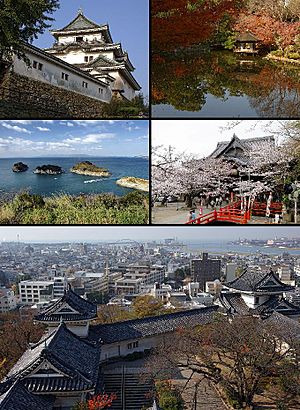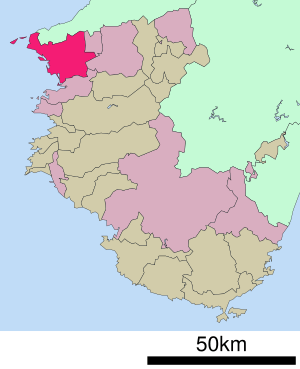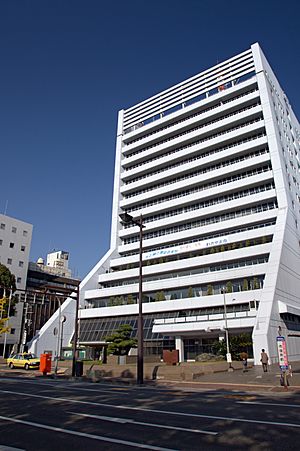Wakayama (city) facts for kids
Quick facts for kids
Wakayama
和歌山市
|
|||
|---|---|---|---|
| Wakayama City | |||

Wakayama Castle, Nishinomaru Garden, Saikazaki, Kimiidera Temple, Downtown Wakayama viewed from the castle keep
|
|||
|
|||
 |
|||
| Country | Japan | ||
| Region | Honshu (Kansai) | ||
| Prefecture | Wakayama | ||
| Area | |||
| • Total | 208.84 km2 (80.63 sq mi) | ||
| Population
(December 1, 2021)
|
|||
| • Total | 351,391 | ||
| • Density | 1,682.58/km2 (4,357.87/sq mi) | ||
| Time zone | UTC+9 (Japan Standard Time) | ||
| - Tree | Cinnamomum camphora | ||
| - Flower | Azalea | ||
| Address | 23 Shichibancho, Wakayama-shi, Wakayama-ken 640-8511 | ||
Wakayama (和歌山市, Wakayama-shi) is a big city in Japan. It is the capital city of Wakayama Prefecture in the Kansai region. As of December 1, 2021, about 351,391 people lived there in 157,066 homes. The city covers an area of 208.84 square kilometers (about 80.63 square miles).
Contents
Geography of Wakayama
Wakayama is located in the northwest part of Wakayama Prefecture. It shares a border with Osaka Prefecture to the north. To the west, it faces the Kii Channel and Kitan Strait. The city is built around the mouth of the Kinokawa River. The main part of the city is on the left side of the river.
Cities and Towns Nearby
Wakayama is close to several other cities and towns. Some of these are:
- In Hyōgo Prefecture:
- Sumoto, Hyōgo (across the Kitan Strait)
- In Osaka Prefecture:
- Hannan
- Misaki
- In Wakayama Prefecture:
- Iwade
- Kainan
- Kinokawa
Climate in Wakayama
Wakayama has a warm and humid climate. Summers are warm, and winters are cool. There is usually not much snow. The average temperature for the year is about 15.6°C (60.1°F). September is the wettest month, with about 1713 mm (67.4 inches) of rain each year. August is the warmest month, with temperatures around 26.4°C (79.5°F). January is the coldest, at about 5.4°C (41.7°F). Sometimes, typhoons can hit the area in summer.
Population Changes in Wakayama
The number of people living in Wakayama grew until the 1980s. Since then, the population has slowly been getting smaller.
| Historical population | ||
|---|---|---|
| Year | Pop. | ±% |
| 1960 | 285,155 | — |
| 1970 | 365,267 | +28.1% |
| 1980 | 400,802 | +9.7% |
| 1990 | 396,553 | −1.1% |
| 2000 | 386,551 | −2.5% |
| 2010 | 369,400 | −4.4% |
History of Wakayama
The area where Wakayama is today has a very long history. It was an important center in ancient times. Large burial mounds called kofun can still be found here. Long ago, a local king ruled the Kinokawa River Valley.
Later, during the Nara period, priests from China built the Kimii-dera temple. Much later, in the Sengoku period, a famous leader named Toyotomi Hideyoshi built an early version of Wakayama Castle. This castle became very important.
During the Edo period, the town around Wakayama Castle grew a lot. It became the main city for the Kii Tokugawa clan. Wakayama officially became a city on April 1, 1889.
However, the city faced challenges. On July 9, 1945, during World War II, Wakayama was bombed. More than half of the city was destroyed, and many people were hurt or died. On April 1, 1997, Wakayama became a "core city." This means it has more power to make its own local decisions.
Economy of Wakayama
Wakayama is the main business city in northern Wakayama Prefecture. It is also the largest city in the prefecture.
Main Industries
- Farming: Farmers in Wakayama grow rice and citrus fruits like mandarins.
- Fishing: Commercial fishing is also an important industry.
- Factories: The city has many factories, especially for electronics and heavy industry. Nippon Steel is a very big employer here. Other large companies include Kao Corporation and Mitsubishi Electric.
Education in Wakayama
Wakayama has many schools and universities for students of all ages.
Colleges and Universities
- Wakayama College of Science Studies
- Wakayama Medical University
- Wakayama Shin-ai University
- Wakayama University
- Takarazuka University of Medical and Health Care Medical School
- Tokyo Health Care University School of Nursing
Schools for Younger Students
The city government runs 50 public elementary schools and 19 public middle schools. There is also one public high school. In addition, there is one private elementary school and three private middle schools.
The Wakayama Prefectural Board of Education runs two public middle schools and 10 public high schools. There are also four private high schools. Wakayama University also runs one elementary school and one high school.
For students with special needs, there are five special education schools run by the prefecture. Wakayama University also runs one. The city also has one school for North Korean students, called Wakayama Korean Elementary and Middle School (和歌山朝鮮初中級学校).
Getting Around Wakayama
Wakayama has many ways to travel, including trains and buses.
Train Lines
 JR West – Hanwa Line
JR West – Hanwa Line
- Kii - Musota - Kii-Nakanoshima - Wakayama
 JR West – Kisei Main Line
JR West – Kisei Main Line
- Kimiidera - Miyamae - Wakayama - Kiwa - Wakayamashi
 JR West – Wakayama Line
JR West – Wakayama Line
- Kii-Ogura - Hoshiya - Senda - Tainose - Wakayama
 Wakayama Electric Railway Kishigawa Line
Wakayama Electric Railway Kishigawa Line
- Wakayama - Tanakaguchi - Nichizengū - Kōzaki - Kamayama - Kōtsū Center Mae - Okazakimae - Kire - Idakiso - Sandō
 Nankai Electric Railway Nankai Main Line
Nankai Electric Railway Nankai Main Line
- Wakayamadaigakumae - Kinokawa - Wakayamashi
 Nankai Electric Railway Wakayamako Line
Nankai Electric Railway Wakayamako Line
- Wakayamashi - Wakayamakō
 Nankai Electric Railway Kada Line
Nankai Electric Railway Kada Line
- Wakayamashi - Kinokawa - Higashi-Matsue - Nakamatsue - Hachimanmae - Nishinoshō - Nirigahama - Isonoura - Kada
Bus Services
- Wakayama Bus
Major Highways
 Hanwa Expressway
Hanwa Expressway Keinawa Expressway
Keinawa Expressway National Route 24
National Route 24 National Route 26
National Route 26 National Route 42
National Route 42
Sister Cities of Wakayama
Wakayama has special "sister-city" friendships with four cities in other countries:
 Bakersfield, California, United States
Bakersfield, California, United States Jeju, Jeju Province, South Korea
Jeju, Jeju Province, South Korea Jinan, Shandong, China
Jinan, Shandong, China Richmond, British Columbia, Canada
Richmond, British Columbia, Canada
The friendship with Jinan, China, started thanks to a man named Hiroshi Yamazaki. He was a medic in the Japanese army who stayed in China after the war. He later visited Wakayama and helped create the sister-city bond.
Fun Places to Visit in Wakayama
Wakayama has many interesting places to explore:
- Hinokuma Shrine
- Itakiso Shrine
- Kamayama Shrine
- Kimiidera
- Kishū Tōshō-gū
- The Museum of Modern Art, Wakayama
- Wakayama Castle
- Wakayama Marina City
- Wakayama is home to one of Japan's three "Melody Roads." These roads have special grooves cut into them. When you drive over them, your car makes music!
Wakayama Prefecture is also famous throughout Japan for its delicious umeboshi (salty pickled plums) and mikan (mandarin oranges).
See also
 In Spanish: Wakayama para niños
In Spanish: Wakayama para niños
 | William L. Dawson |
 | W. E. B. Du Bois |
 | Harry Belafonte |








